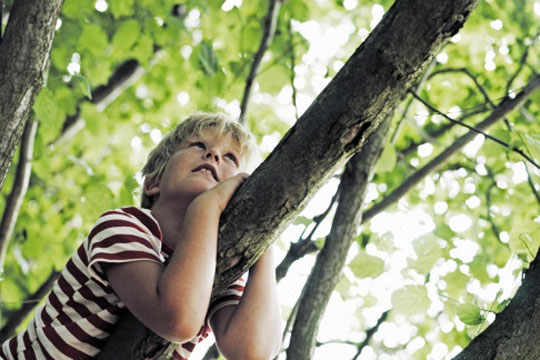Most adults climbed trees and played outdoors when they were
children. But today's young people don't play outdoors like their
parents. It's an omission with grave implications. Nature is unruly,
untamed. But it is also our future.

We may have disconnected from nature, but we are delusional if we
think we can live without it. Ignoring the value and contribution of
nature to our well being is, quite literally, life threatening. But
ignoring is exactly what we're doing. In his 2005 book, Last Child in
the Woods, author
Richard Louv, gave this ignorance a term: Nature Deficit Disorder.
While not a medically recognised condition, there is an ever
expanding body of work which supports Louv's central theme: that
deprivation of a relationship with nature is fraught with multiple
health and welfare issues. For people. And planet.
Experiencing nature in an outdoor setting can help tackle not only
physical health
problems such as obesity and coronary heart disease, but also mental health problems. Children benefit greatly from unstructured play, particularly make-believe play. And children are far more creative in natural play spaces than on the typical flat playground, whether it’s made of concrete or turf. They are far more likely to invent their own games in natural places. And in schools that have outdoor classrooms children tend to do better across the board from social studies to standardized testing. It seems to me that using all of your senses at the same time is the optimum state of learning. When you’re sitting in front of a computer screen, or locked in a cubicle called a classroom, you’re not using all your senses at the same time. Outdoors, you are.
problems such as obesity and coronary heart disease, but also mental health problems. Children benefit greatly from unstructured play, particularly make-believe play. And children are far more creative in natural play spaces than on the typical flat playground, whether it’s made of concrete or turf. They are far more likely to invent their own games in natural places. And in schools that have outdoor classrooms children tend to do better across the board from social studies to standardized testing. It seems to me that using all of your senses at the same time is the optimum state of learning. When you’re sitting in front of a computer screen, or locked in a cubicle called a classroom, you’re not using all your senses at the same time. Outdoors, you are.
Nature play has also been correlated
with a longer attention span, and studies show it’s an antidote to
child obesity. Psychological health is another benefit: children with
more experience in nature, even if it’s just a view from their room
of a natural landscape are more psychologically resilient, or
correlated to more psychological resilience. Creativity, greater
capacity for attentive learning, sharpened senses, physical fitness,
psychological resilience—there’s clearly no dearth of reasons to
get children outdoors as early as possible.
Developing this early connection with nature has a deep and
profound influence on children's intellectual health as well. Richard
Louv's book is packed with examples, including the school who
educated their children out amongst local rivers, mountains and
forests, "96 per cent of [their] students meet or exceed state
standards for math problem-solving—compared to only 65 per cent of
eighth graders at comparable middle schools."
And let's not forget family weekends camping in the bush; or
simply get down and dirty, rolling in the grass and watching bees in
the backyard or nearby park, with Mum and Dad. For as William
Shakespeare penned, "One touch of nature makes the whole world
kin."

No comments :
Post a Comment